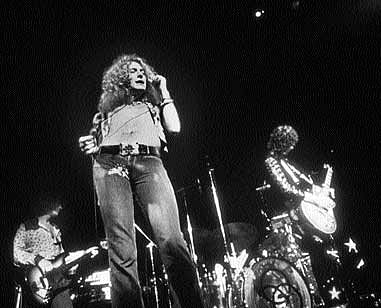Musical tsunami of 'Whole Lotta Love' in Moscow

For me, the beginnings were rather commonplace — childhood plus piano, the normal Soviet routine: Schumann’s ‘Merry Peasant,’ Bach’s ‘Rigaudon,’ ‘For Elise’...
Then my pinkie got caught in the chaise longue that my friend had kicked out from under me. With a shortened finger, prospects for the piano vanished. The piano still gave pleasure; keys warmed by the sun gave off a cozy smell and felt good to the touch, as did the yellowed pages of music. But there was no kick.
That happened one pleasant September afternoon in 1972, in the apartment of my classmate Vitya, who that summer became the world student table tennis champion and brought back from unattainable Stockholm three records: Led Zeppelin (‘II’), Deep Purple (‘Machine Head’) and Uriah Heep (‘Look at Yourself’).
I was 18, and not entirely pop-illiterate: the ‘Beatli,’ the ‘Rollingi’ and the Monkees were always seeping out of friends’ tape recorders, opening up new, unknown sounds and spaces. But all that was anticipation; it was as if we were being prepared for something big, something that would make the blood curdle in our veins.
And curdle it did when Vitya pulled the new Zeppelin LP out of what at the time was a mind-blowing sleeve and put it on, and ‘Whole Lotta Love’ rose up with a beckoning howl.
Corks formed of cloying Soviet music flew out of our ears. And a young man’s brain experienced irreversible biochemical change. It was the unforgettable lesson of freedom. It was probably on that very day that I spontaneously became a dissident.
Novel experience
I remember how Andrei Makarevich (the lead singer of the Soviet rock band Time Machine) said that when he heard the Beatles for the first time it was as if pillows fell off his ears. Vasily Aksyenov (the writer) had the same experience when he first heard postwar American jazz.
For my generation, the Soviet pillows were thrown off by hard rock. The feathers, I must say, flew far: after Page, Gillen and Plant, the Soviet ‘VIA’ (vocal-instrumental ensembles) became hopelessly covered by a shroud. It became impossible to take them seriously. They became the stuff of crass jokes, good for drunken dance floors where you could nuzzle a soft and unpretentious babe.
We began inviting underground rock bands — Ruby Attack, Pure Chance, Leap Year Summer — to our student parties. They played the rock hits. I must say that to the dismay of our girlfriends, at these ‘sessions’ we usually just listened — no dancing. The lessons of freedom continued.
It’s fashionable now to say that the ‘sovok’ — the Soviet era — was undermined by the fall of oil prices in the 1980s. I’m convinced that even before that there was a mass falling of corks from the ears of the young. Young Soviet brains were cleared by western rock music. Jimi Hendrix, with his screaming Fender Stratocaster, unknowingly probably did more to demolish the Soviet mentality than even Solzhenitsyn and his ‘Archipelago.’
Soon after that memorable day at Vitya’s, I found myself with my Elektronika tape recorder and tapes of the aforementioned monsters of rock in an obscure village near Kaluga, where I listened to the recordings myself and had the pleasure of playing them for three local guys and knocking the corks out of their ears.
I can see it now: the cool evening dusk at the edge of the village, a pair of hobbled horses grazing nearby, a plowed field gently sloping to a forest dressed in autumn finery, a campfire, three rural lads, me with the Elektronika on my knees, the mooing of recently milked cows, and ‘Whole Lotta Love.’
Languages from the West
The force of the rock tsunami which dealt so destructive a blow to the ‘sovok’ in the early 1970s indisputably arose not only from all the utterly new sounds and instrumental possibilities, but also from the fact that all these Robert Plants and Ian Gillans sang in the language of the West — a forbidden tongue kept from us by maybe not quite an Iron Curtain, but at least a wooden one.
We Soviet students saw the long-haired vocalists as angels come down to earth to sing in heavenly tongues. Having studied English through texts like ‘Lenin in London,’ we had a hard time sorting out the words. But the more advanced melomaniacs got them, memorised them and sang them to their guitars.
Thus Anglo-rock for many of my contemporaries became Angelic-rock. We believed in it, we forgave it everything. We imbued the relatively primitive lyrics with layers of meaning that their hirsute authors never dreamed of. A friend of mine seriously insisted that ‘Satisfaction’ was about a free, complex and tragic love affair of two underground anarchists, and that ‘Stairway to Heaven’ was written by a famous English mystic who was publicly burned in medieval England for his experiments in the occult.
Great myths accompanied the rock-tsunami like ocean foam, awakening our fantasies, leading us to dream impossible dreams — like attending a ‘Zeppeliny’ or the ‘Rollingi’ concert in Moscow. Alas, in 1972 it was easier to grow wings and fly over the Brezhnevite wooden curtain. The septuagenarian members of the Politburo did not let us listen to our beloved angels and their Stratocasters. (Later, under Mikhail Gorbachev’s policy of glasnost, Uriah Heep became the first Western band to play in Soviet Russia.)
There is much that can never be forgiven the sovok, as it was built on human bones and the suppression of freedoms. As Nabokov said, “The crimes of Bolshevism cannot be expiated.” I will never forgive the senile Soviet power for not allowing a single western mega-rock-group into Moscow in the 70s.
The New York Times
Deccan Herald is on WhatsApp Channels| Join now for Breaking News & Editor's Picks